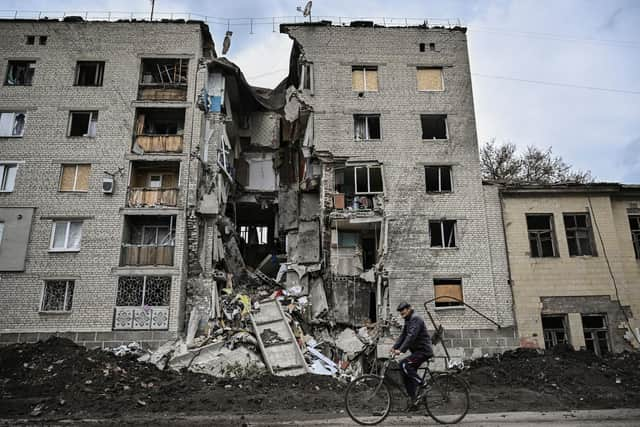Russia and Ukraine lies threaten to ratchet the war - Patrick Mercer
Let me illustrate. At the start of the war, Kiev made great play about the Ukrainian garrison of the strategically important Snake Island telling the good ship Moskva to ‘go f… yourself’ when she called upon them to capitulate.
The defenders were then, apparently, raked with gunfire and killed before Mr Zelensky decorated them for bravery. Sadly, it wasn’t true: the garrison did, indeed, surrender and are now imprisoned in Sebastopol. The whole thing was a lie.
Advertisement
Hide AdAdvertisement
Hide AdSometime later the same ship was struck by Ukrainian Harpoon missiles, set on fire and sank with multiple casualties. She was the flagship of the Russian Black Sea Fleet and the Kremlin covered up by suggesting that she’d accidentally caught fire and then went down in a storm. The whole thing was a lie.


Whilst I’m slightly sympathetic to the actual protagonists for beating their war drums over stuff like this, I find it much harder to understand why third parties, who should be so much more objective, peddle similar lines. For instance, a prominent BBC correspondent when summing things up in his report from Kiev on May 9 – Russia’s Victory Day when the triumph over Nazism in 1945 is celebrated – gave a long list of the Kremlin’s failures and said that President Putin had achieved nothing in the war.
Now, I’m acutely conscious of how sympathetic public opinion is towards Ukraine, but saying such things is just delusional. A quick look at a campaign map shows rather more than 20 per cent of Ukrainian territory is in Russia’s hands and, while attempts to grab Kiev certainly failed bloodily, a great swathe of land from Donetsk, north of Crimea to the outskirts of Mykoliev has now been seized.
This 280-mile corridor is highly prized by Moscow and is likely to be complemented, I’d suggest, by the capture of the entire Donbas region within a few months.
Advertisement
Hide AdAdvertisement
Hide AdWhile journalists will always strive to produce ear catching headlines, it’s a very different matter when Andriy Yermak, Ukraine’s presidential chief of staff, recently proclaimed: “The war must end with the complete restoration of Ukraine’s territorial integrity and sovereignty.”
I recognise that he’s at the centre of this crisis and that he might be trying to bolster national morale, but what he said is nonsensical.
I know I’ve made this point before, but the whipping up of hatred towards Russia and all things Russian – the banning of their athletes, music, dance and literature, the cancelling of their culture – while stoking unrealistic expectations about how the Kremlin’s ambitions can be curbed, is daft. We need to be cool-headed and rational about Russia’s short and medium term war aims if we are to defeat or, at least, contain them – just as we were about our enemies in the Second War.
Let me hazard a guess at how things might develop in the near future. First, Russia’s campaign in the Donbas is accelerating against exhausted Ukrainian troops who have little air cover and not much fuel. There are also grisly details of the daily casualties that Ukraine is suffering and, while I’m sure those are exaggerated, Kiev is beginning to admit how dangerous things are looking in the east.
Advertisement
Hide AdAdvertisement
Hide AdNow, while I’m sure that the troops who do fight on will score some limited, tactical successes as they did in Kharkiv, I suspect that their gallant resistance cannot continue for much longer.
Second, if Russia were to try to seize Odessa she would overextend herself more than she already has. And why should she? Her fleet is blockading Ukraine’s only remaining port and time is now on her side, just like it was in 2014 after Crimea fell. President Putin will shortly be able to wait and see how his opponents react before he needs to do anything.
And those reactions have, so far, been less than impressive. Certainly, the West have sanctioned Russia with a will and sent weapons, but Nato’s response has been dilatory and fragmented.
For example, the new battle groups promised for Bulgaria, Romania, Slovakia and Hungary are nowhere in sight while Nato’s most vocal and jingoistic spokesman – Boris Johnson – is simultaneously cutting Britain’s fighting forces.
Advertisement
Hide AdAdvertisement
Hide AdNato’s wild card, though, could be Poland. Might she move into western Ukraine – with or without President Zelensky’s blessing – perhaps as far as the Dneiper? That would effectively partition the country and simultaneously alienate Poland from the rest of Nato and sunder the whole alliance.
Then conjure with this: after an operational pause of, say, two years, might Russia decide to move again? An an amphibious operation to outflank Odessa, to push hard into friendly Transnistria and then leave the Kremlin’s men poised to strike deep into western Ukraine might be attractive.
It would be a great mistake, though, to think that Russia doesn’t study America and the West and carefully analyse how we might react to her moves.
My Russian friends never fail to remind me how Poland was treated in 1940 while telling me how weak they believe we are, how fragmented and degenerate. When I argue back they simply reply, “And how did it go in Afghanistan last year?”: it’s difficult to make any sort of answer to that.
Advertisement
Hide AdAdvertisement
Hide AdThe Americans use the phrase “whistling past the graveyard” – meaning that you persuade yourself that all is well and trill happily in the face of mortality: I think that’s what we’re doing by hoping that Russia’s finished.
We must shake ourselves out of this delusion because we stand on the brink of disaster when clear thinking and a recognition of the truth have never been more vital.
- Patrick Mercer is a former Conservative MP for Newark and Army colonel.